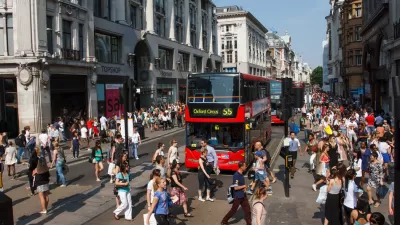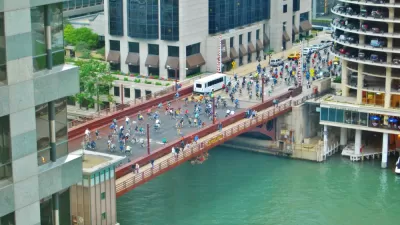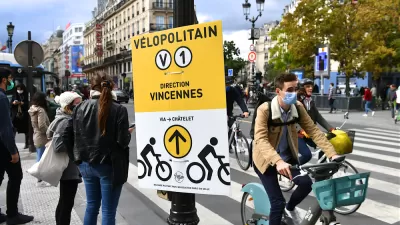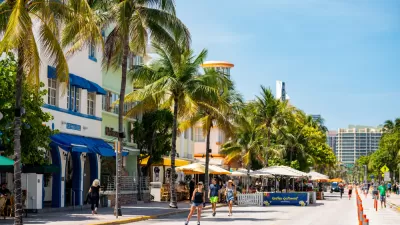As local councils debate making permanent changes implemented last year, can pedestrian and cycling advocates hold on to their victories?

Since the start of the pandemic, writes Niamh McIntyre for The Guardian, England's roads have been the testing grounds for a "grand experiment" that has led to a bitter standoff between pedestrian advocates and motorists. As part of mayor Sadiq Khan's Streetspace plan, implemented last year as an "urgent and swift response" to the pandemic and London's broader need to reduce congestion and pollution, "funnelled money from the government’s new active-travel fund to London’s boroughs for low-traffic neighbourhoods (LTNs) and other projects to encourage walking and cycling, such as temporary cycle lanes and timed road closures outside schools."
Since almost half of London car trips are under two miles, "the theory is that by reducing the amount of road space for cars, people will find other ways to make short journeys." Opponents argue that not everyone can easily take alternate routes, and that the measures only increase traffic and congestion on other streets—an assertion not borne out by evidence: "early monitoring of new LTNs in Hackney and Lambeth found that traffic on main roads hardly increased at all," and "data from established LTNs in Walthamstow showed the opposite."
While early "enthusiasm for LTNs brought about a rare consensus between the Conservative government and the Labour mayor of London, as well as Greens and pro-cycling groups," the backlash as traffic returns to London streets has been severe. In addition to DIY removal of LTN infrastructure, "opponents of the mayor’s walking and cycling plans have pursued numerous legal challenges to the new policies."
The future of LTN and other programs started during the pandemic will hinge on the next few months "as councils push for temporary schemes to become permanent, and objectors fight for the right to drive wherever they need to go."
FULL STORY: Traffic wars: who will win the battle for city streets?

Study: Maui’s Plan to Convert Vacation Rentals to Long-Term Housing Could Cause Nearly $1 Billion Economic Loss
The plan would reduce visitor accommodation by 25,% resulting in 1,900 jobs lost.

North Texas Transit Leaders Tout Benefits of TOD for Growing Region
At a summit focused on transit-oriented development, policymakers discussed how North Texas’ expanded light rail system can serve as a tool for economic growth.

Alabama: Trump Terminates Settlements for Black Communities Harmed By Raw Sewage
Trump deemed the landmark civil rights agreement “illegal DEI and environmental justice policy.”

How Community Science Connects People, Parks, and Biodiversity
Community science engages people of all backgrounds in documenting local biodiversity, strengthening connections to nature, and contributing to global efforts like the City Nature Challenge to build a more inclusive and resilient future.

Alabama: Trump Terminates Settlements for Black Communities Harmed By Raw Sewage
Trump deemed the landmark civil rights agreement “illegal DEI and environmental justice policy.”

Dear Tesla Driver: “It’s not You, It’s Him.”
Amidst a booming bumper sticker industry, one writer offers solace to those asking, “Does this car make me look fascist?”
Urban Design for Planners 1: Software Tools
This six-course series explores essential urban design concepts using open source software and equips planners with the tools they need to participate fully in the urban design process.
Planning for Universal Design
Learn the tools for implementing Universal Design in planning regulations.
City of Santa Clarita
Ascent Environmental
Institute for Housing and Urban Development Studies (IHS)
City of Grandview
Harvard GSD Executive Education
Toledo-Lucas County Plan Commissions
Salt Lake City
NYU Wagner Graduate School of Public Service





























